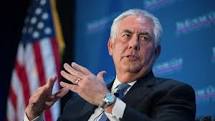|

Syria, North Korea, Afghanistan, Russia: These are just some of the unresolved global crises that President Trump inherited. But the new administration is being forced to manage all these crises with one hand tied behind its back because it lacks a fully staffed State Department.
The president demonstrated that he intends to embark on an aggressive, forward-leaning, hard-power-based foreign policy with the strikes against Syria following the chemical weapons attack against civilians, the use of the Massive Ordnance Air Blast (MOAB) in Afghanistan, the tough posture toward North Korea and the devolution of greater authority to the military in operational theaters.
At the same time, in line with much of his campaign rhetoric, Trump has proposed a series of significant cuts at the State Department and the U.S. Agency for International Development, while refraining from filling most of the appointed positions in Foggy Bottom.
The White House seems to think that military muscle and effective soft power are mutually exclusive — but in reality, the president can employ both at the same time. In fact, it is imperative that he does so for our country’s national security.
Does the State Department need reforming and streamlining? Yes.
Over the past few decades, the department has grown to include a number of offices and personnel that could be downsized and refocused. At times, Foggy Bottom has seemed entirely disconnected from the realities we face internationally — a rather surprising observation. The State Department was found wanting in Iraq and Afghanistan, unable to provide the personnel and expertise needed to support counterinsurgency campaigns in both countries. Yet, at the same time, the department had numerous duplicative outreach and grant programs in place around the world.
These programs do have a place in our foreign policy — but an honest accounting of the missions, mandates, personnel and resources would undoubtedly lead to rationalization, increased efficiency and cost savings.
Is starving the State Department of leadership the way to achieve this goal? No.
Right now, there are nearly 100 unfilled political appointees and ambassadorships at the department. These include the deputy secretary of state; deputy secretary of state for management and resources; undersecretary for management; undersecretary for arms control and international security; undersecretary for civilian security, democracy and human rights; undersecretary for economic growth, energy and the environment; and counselor of the department. Of the nine senior officials at the department who sit below the secretary, only two slots are filled.
Given the crisis with North Korea, having an undersecretary for arms control and international security would probably be helpful. How about the situation in Syria? An undersecretary of civilian security, democracy and human rights would likely be useful as well.
Aggressive diplomacy requires personnel who know the countries, the issues and how to navigate complex social, cultural and political webs. At the moment, we’re on a dangerous path to losing that capability through unfilled posts.
No less than Trump’s defense secretary, Jim Mattis, said in 2013: “If you don’t fully fund the State Department, then I need to buy more ammunition.” A strong diplomatic effort must support a strong military effort. The two are not mutually exclusive, but are mutually beneficial to America’s interests.
The president’s use of the vice president and others to fill the void is unsustainable. Vice President Pence, while eminently capable, cannot be the president’s lead diplomat in South Korea.
State Department political appointees are more than just representatives of the administration. They are the gears that turn the policy machine, communicate its message and develop and implement policy. Without them, nothing gets done smoothly, if at all.
And if the president wants to reform Foggy Bottom, it is imperative that he appoint people to do the job. Preventing the State Department from functioning by leaving key leadership positions vacant is not reform; it simply prevents critical diplomatic operations from taking place.
An effort to appoint reformers must take into consideration the need to carry out the vital diplomatic mission of the department. The president would be well served by selecting experienced diplomats who share his vision of reform, and undoubtedly there are many available. Secretary of State Rex Tillerson brought with him a unique combination of business acumen and international experience. While not a traditional diplomat, he does seem to embody the goals of the president.
But Tillerson cannot do it alone. He must be surrounded by trusted deputies who can carry out the business of diplomacy along with the business of reform.
|



